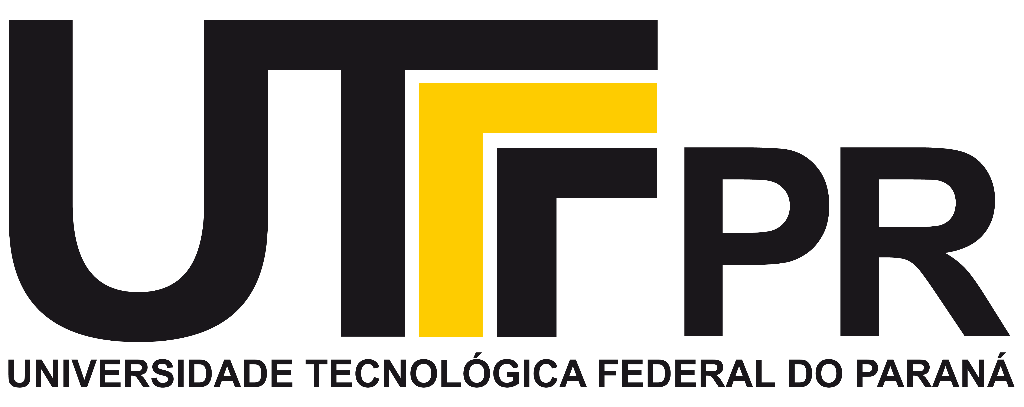2021 edition
Designs of the Oppressed was a free online course offered by UTFPR, in partnership with the Design & Oppression network and Andifes, which launcheud the International Virtual Mobility Program “Destination Brazil” in 2021 with the purpose of strengthening Brazilian universities’ international reach. The course run from 15/07/2021 – 26/08/2021. This page share its open syllabus.
Music playlist
Pedagogical approach
- Designs of the Oppressed is an attempt to recontextualize Critical Pedagogy to 2021’s pandemic emergency remote education
- The course is composed mainly of 6 dialogues of 2 hours each spread through 6 weeks, supplemented by course readings (50 pages per week on average), and some optional assignments
- The dialogues run through a Discord server where students were able to interact with lecturers and other students through several text and audio channels. Online whiteboards were used eventually. Video conferences weren’t used so that the course could be accessible to participants with limited internet connections and mobile devices.
- The dialogues were conducted in international English with diverse accents.
- Those who were not able to speak English could write in the text channels, with the eventual help of automated text translators.
- Students were able to reflect and compare their experiences in fighting oppression to those presented by the guest lecturers.
- Each class was structured by a pre-recorded short audio lecture with no slides, selected Brazilian music, basic and additional readings, extra audiovisual materials when available, and assignments. Check the recordings below. The dialogues were not recorded to respect participants’ privacy.
- All course materials are openly available on this webpage for those who could not enroll. The syllabus and lectures are licensed under a Creative Commons Attribution ShareAlike license. Please let us know of any reuse of these open educational resources.
Best moments
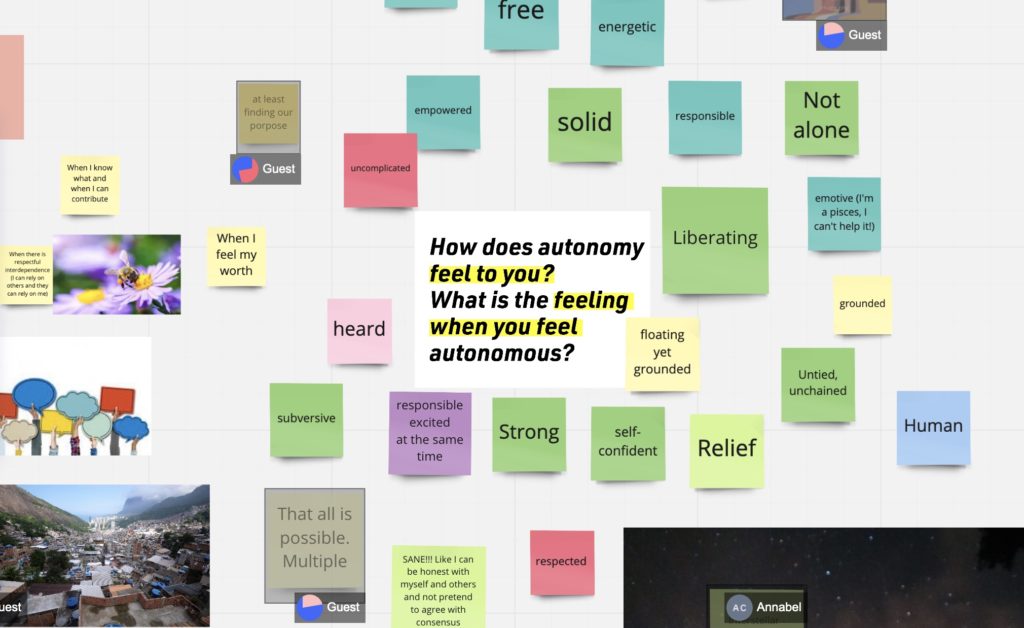
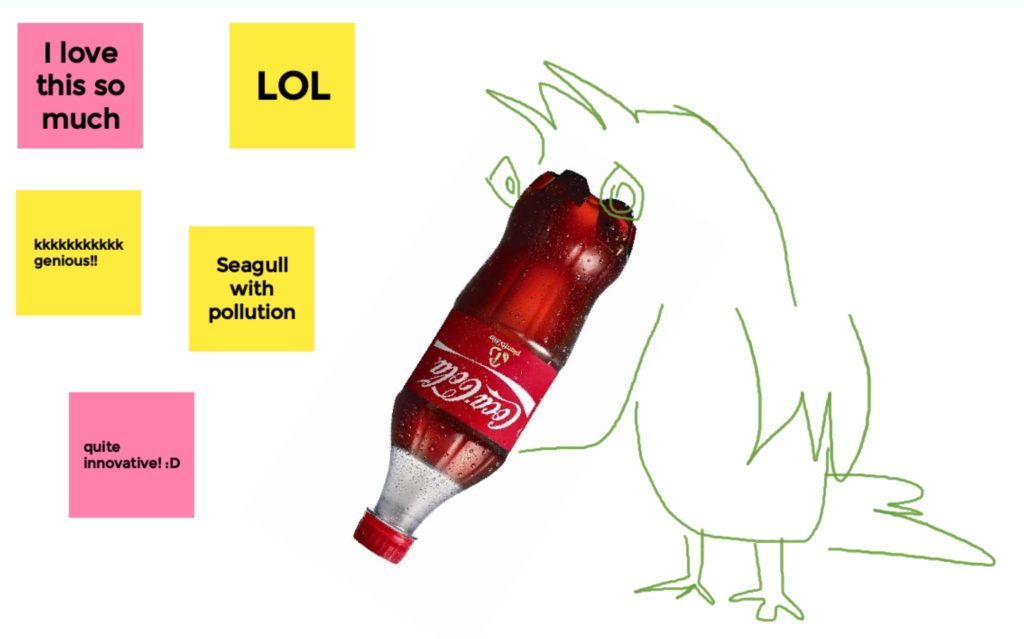
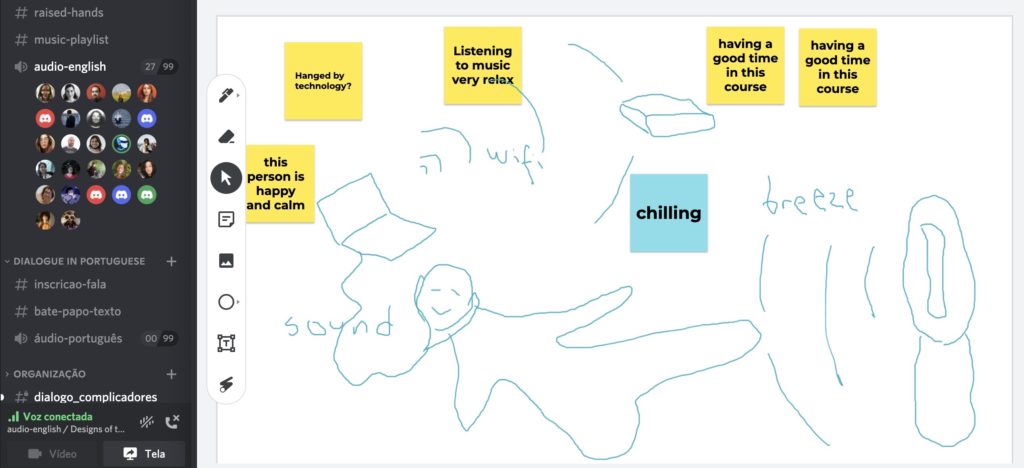
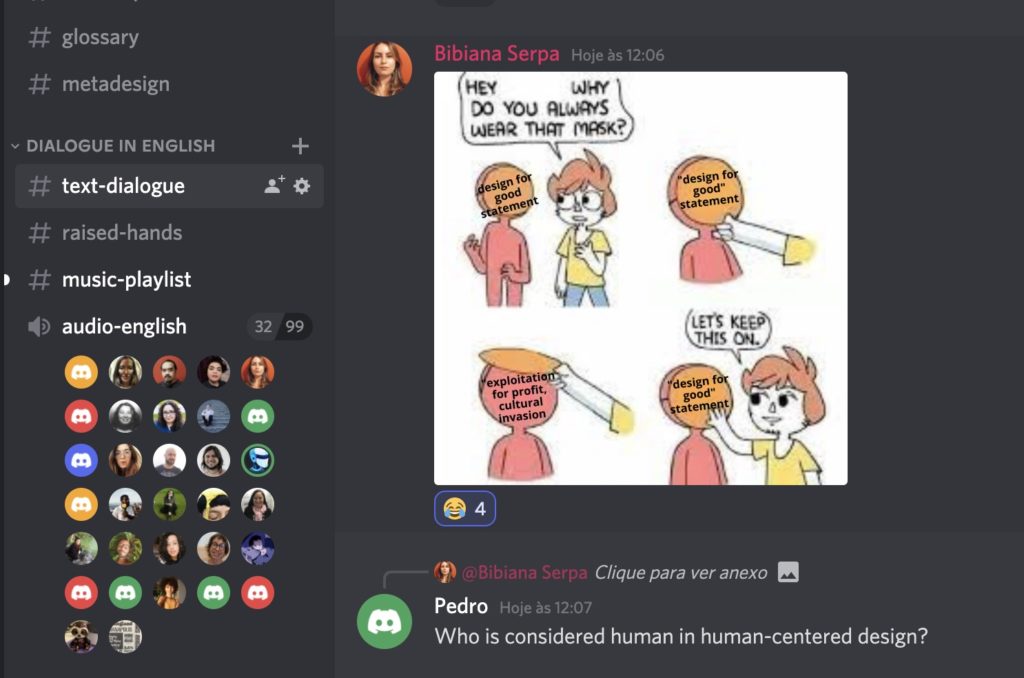
Syllabus
Week 1 (8-15/07/2021): Contextualizing Pedagogy of the Oppressed, Theater of the Oppressed, and Designs of the Oppressed
Lectures
Music
Meu Caro Amigo(1976), Chico Buarque <https://www.youtube.com/watch?v=yqVLC_tPgUc>
A Cara do Brasil (1999), Ney Matogrosso <https://www.youtube.com/watch?v=6yiQg47H5W8>
Basic readings
Gadotti, M., & Torres, C. A. (2009). Paulo Freire: education for development. Development and change, 40(6), 1255-1267. (13 pages).
Dalaqua, G. H. (2020). Aesthetic injustice. Journal of Aesthetics & Culture, 12(1), 1712183. (13 pages).
Additional readings
Boal, A. (2006). The aesthetics of the oppressed. Routledge.
Freire, P. (1996). Pedagogy of the oppressed. New York: Continuum.
Instituto Paulo Freire archives <http://www.acervo.paulofreire.org/handle/7891/4>
Audiovisual materials
Seeing Through Paulo’s Glasses: Political Clarity, Courage and Humility. (2012). Directed by Shirley Steinberg and Giuliana Cucinelli <https://www.youtube.com/watch?v=U4jPZe-cZgc>
Maioria absoluta. (1964). Directed by Leon Hirszman <https://youtu.be/Vsmg36X1eAM>
Augusto Boal: Memoirs of Legend. Directed by GULAB. Part 1 <https://www.youtube.com/watch?v=B1gku4tmIbE> Part 2 <https://www.youtube.com/watch?v=HZrxoiADgDs>
Assignment for next week
Tell us about a participatory experience. Write a very short report describing a participatory design experience you were involved in. Some questions you might consider: How the theme or the design problem was chosen? Who defined the methods and tools used? Who participated in the process? How did discussions and decision processes take place? Was the opinion of the participants really considered? What were the difficulties and the conflicts in the process? Was everyone satisfied with the final result? Send an image if you want!
Week 2 (16-22/07/2021): Not a gift, not a self-achievement, but a mutual process: freire-inspired design approaches
Lectures
Music
É tudo pra ontem. Emicida com a participação do Gilberto Gil (2020) <https://www.youtube.com/watch?v=qbQC60p5eZk>
Linha abissal. Renan Inquérito e Boaventura de Sousa Santos (2018) <https://www.youtube.com/watch?v=AlHnMgu_Hys>
Basic readings
Serpa, B., Portela, I., Costard, M., & Silva, S. M. (2020, June). Political-pedagogical contributions to participatory design from Paulo Freire. In Proceedings of the 16th Participatory Design Conference 2020-Participation (s) Otherwise-Volume 2 (pp. 170-174).
de Araujo, R. M. E., Côrtes, C. A. L., & Farbiarz, J. L. Design em Parceria: experiências de ensino de projeto em design fundamentadas na participação e no diálogo.
Duarte, R. (1965). Notas sobre o desenho industrial. Revista Civilização Brasileira, Rio de Janeiro, (4), 227-247.
Audiovisual materials
Lina Bo Bardi e as influências e heranças da Bahia, TV UFBA (2014). https://www.youtube.com/watch?v=9fwtwODu4bo
Week 3 (23-29/07/2021): Design and politics (Eva viu a uva?)
Lectures
Music
Latinoamerica, Calle 13 (2010). https://www.youtube.com/watch?v=DkFJE8ZdeG8
Canto da Revolução, Doralyce (2016). https://www.youtube.com/watch?v=LqlzCYDUfvI
Basic readings
Serpa, Bibiana; Mazzarotto, Marco. Eva viu a uva? Desvelando dimensões políticas em design com Paulo Freire. (não publicado)
Freire, P. (1996). Pedagogy of the oppressed. New York: Continuum. Chapter 1 (pp 43-69)
Additional readings
Mazzarotto, Marco. (2020) As contribuições de Paulo Freire para um Design Emancipatório. In: Abreu, Janaina M. and Padilha, Paulo Roberto (editors). Paulo Freire em Tempos de Fake News. São Paulo: Instituto Paulo Freire, p. 171-179.
Audiovisual materials
Paulo Freire e Política. Interview fragment. https://www.youtube.com/watch?v=5TJi1UW9Q2I&t=106s
Assignment for next week
Write about a case (personal or one that you are familiar with) of design projects you consider
a. good and socially engaged, or
b. not very good even if they pretend to be socially engaged.
Suggestion
- what is the case.
- where the project happened
- who was involved in the development of the project
- what was the outcome of the project
- why it is a cool project or not, and
- generated impact
- links if there are any
Week 4 (30/07-05/08/2021): No one is the subject of the autonomy of someone else: design and autonomy
Lecture
Music
Principia, Emicida (2019) <https://www.youtube.com/watch?v=kjggvv0xM8Q>
All is violent, all is bright, God is an Astronaut (2005) <https://youtu.be/DaUECAqHo3I>
Mdou Moctar, Tiny Desk (2021) <https://www.youtube.com/watch?v=khUmz4d2Hv8>
Bonus music playlist préocupe [after do fim do mundo]
Basic readings
Souza, Eduardo. Isso não é uma autonomia. Disponível em: <https://revistarecorte.com.br/artigos/isso-nao-e-uma-autonomia/> [in Portuguese]
<https://medium.com/@souzaeduardo/this-is-not-an-autonomy-d255c7e5db73> [in English]
Freire, Paulo. (2001). Pedagogy of freedom: Ethics, democracy, and civic courage. Rowman & Littlefield Publishers. Chapter 3: Teaching is not just transferring knowledge.
Additional reading
Vieira Pinto, Álvaro. Por que os ricos não fazem greve? Cap. 2 Que é a greve?
Audio material
Podcast | desdesign – “Criando no caos do apocalipse” por préocupe [in Portuguese] https://open.spotify.com/episode/3zetUNqd78zx60z4imJN84?si=1e2b8ea2d7f6422e
Week 5 (06-12/08/2021): Systems are not oppressors, but they can be oppressive: on technology-mediated oppression
Lectures
Music
Queremos Saber, Gilberto Gil (1970), <https://www.youtube.com/watch?v=2gs4_MO5n1k>
Cérebro Eletrônico, Gilberto Gil (1969), <https://www.youtube.com/watch?v=-J5gTpiI3KU>
Objeto Semi-Identificado, Gilberto Gil, Rogério Duprat e Rogério Duarte (1969), <https://www.youtube.com/watch?v=c85xRTJMc1k>
Pela Internet, Gilberto Gil (1996),<https://www.youtube.com/watch?v=Egh9r2AjTBs>
Basic readings
Van Amstel, Frederick M.C and Gonzatto, Rodrigo Freese. (2020) The Anthropophagic Studio: Towards a Critical Pedagogy for Interaction Design. Digital Creativity, 31(4), p. 259-283 (24 pages).
da Costa, B. A., & Martins, A. E. M. (2020). Álvaro Vieira Pinto on the concept of technology: an introductory discussion. O que nos faz pensar, 29(47), 108-123 (16 pages).
Additional readings
Gonzatto, R. F., & van Amstel, F. M. (2017, October). Designing oppressive and libertarian interactions with the conscious body. In Proceedings of the XVI Brazilian Symposium on Human Factors in Computing Systems (pp. 1-10).
da Costa Marques, I. (2016). What can STS do with and for Latin America? An anthropophagic response and some examples. Contributions to Alternative Concepts of Knowledge. M. Kuhn and H. Vessuri. Stuttgart, Germany, IBIDEM: 123-142
Assignment for next week
Write a Journal of Hope: a journey on the Freirean theme of dreams, futures and the project.
Week 6 (13-19/08/2021): Design, Hope and Utopia
Lectures
Music
O futuro não demora, Baianasystem (2019) <https://www.youtube.com/watch?v=pewLsjAwzPA>
Liberdade, A Filha do Vento album, Cordel do Fogo Encantado (2018) <https://www.youtube.com/watch?v=10lOuMRo_B8>
Basic Readings
Giroux, Henry, e Peter McLaren. “Paulo Freire, Postmodernism and the Utopian Imagination: A Blochian Reading”. Education Faculty Books and Book Chapters, 1º de janeiro de 1997. http://digitalcommons.chapman.edu/education_books/107.
Felipe, Sônia Teresinha. “O conceito de utopia na proposta Paulofreireana”. Revista de Ciências Humanas – RCH. Editora UFSC, 1984.
Silva, Claudia Bordin Rodrigues da. Projetar para a Esperança: prática de pesquisa em Design de Interação sobre as concepções de esperança de Paulo Freire, 2017. EM: CAPA – Culturas, Alteridade e Participação em IHC. http://capaihc.dainf.ct.utfpr.edu.br/livro/Ebook_CAPA-CulturasAlteridadesEParticipacoesEmIHC_2020.pdf
Additional Readings
Neto, Elydio dos Santos. Hope, utopia and resistance in the formation and practice of educators in a neo-liberal context. Revista de Educação do Cogeime, Ano 13, no.24, junho de 2004.
Silva, Claudia Bordin Rodrigues da. Consciência e ação em design de interação: recursos e práticas educacionais abertas para o esperançar. 2019. Tese (Doutorado em Tecnologia e Sociedade)
Audiovisual
Excertos de “Paulo Freire: Ideais, Mitos e Utopias no Final do Séc. XX” – Universidade de Buenos Aires, Argentina. https://www.youtube.com/watch?v=VrBidYhH25A
Lecturers
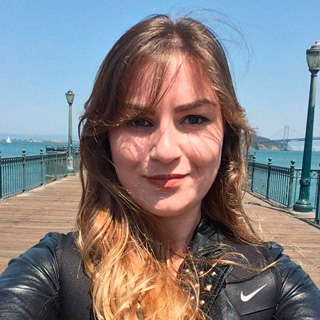
Bibiana Oliveira Serpa is PhD candidate in Design at ESDI/UERJ. She is co-editor of the International Journal of Engineering, Social Justice and Peace. She is an organized feminist militant and a social educator at the Universidade Livre Feminista, a popular education initiative focused on promoting political education among women belonging to social movements in Brazil. She has experience in participatory projects and design for community emancipation in different locations in Latin America. Her research associates participatory design approaches to politicization actions within social movements and seeks to understand ways for an engaged design practice having as reference popular education and anti-racist and anti-capitalist feminism.
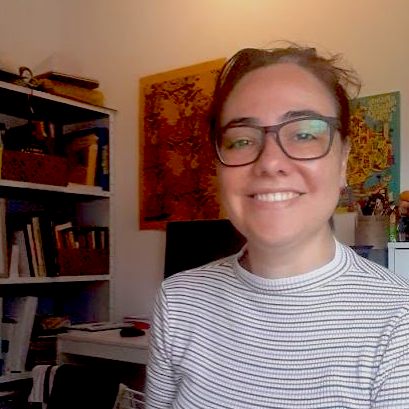
Claudia Bordin Rodrigues is design professor at Federal University of Technology – Paraná (UTFPR) and a researcher at XUE Participation, Interaction and Computing research group. Her research spread through the fields of Open Education and Interaction Design. She has a doctoral degree and a master degree from the Graduate Program in Technology and Society (PPGTE-UTFPR), where she studied Brazilian Human-Computer Interaction and Interaction Design education, based on critical and liberating perspectives. Claudia is an advocate of open educational resources (OER) that stem from collective projects and individual hopes, in line with Paulo Freire’s critical pedagogy. Her publications develop humanistic concepts for project-oriented studies on Science, Technology, Society, and Culture (STS), including the design and use of digital computer artifacts.
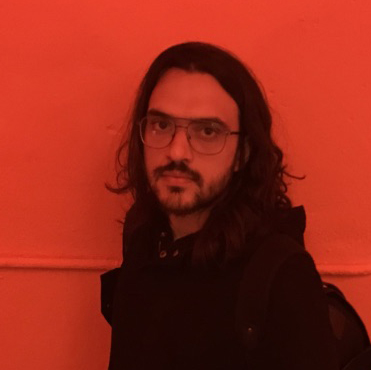
Eduardo A B M Souza is graphic design professor at Instituto Federal de Pernambuco (IFPE) and PhD candidate at Universidade Federal de Pernambuco (UFPE), Brazil. His current research elaborates critical pedagogical practices for graphic design education in the form of workshops autonomously organised by students to foster autonomy and politicisation. Also interested in design theory, philosophy of design and media theory, his previous publications discuss the status of form in design. He also writes and translates texts on design, besides working as graphic designer and illustrator.

Frederick (Fred) van Amstel is Assistant Professor of Service Design and Experience Design at the Industrial Design Academic Department (DADIN), Federal University of Technology – Paraná (UTFPR), Brazil. His PhD thesis, accepted by the University of Twente, maps the contradictions faced by architectural design and service design in contemporary practice. Instead of eliminating them, expansive design harnesses contradictions as a source of change. Several articles on this topic have been published by international journals like Design Studies, Digital Creativity, Strategic Design Research Journal, and Building Research & Information. His recent research deals with the contradiction of oppression and the possibility of designing for liberation through decolonizing and hybridizing design.
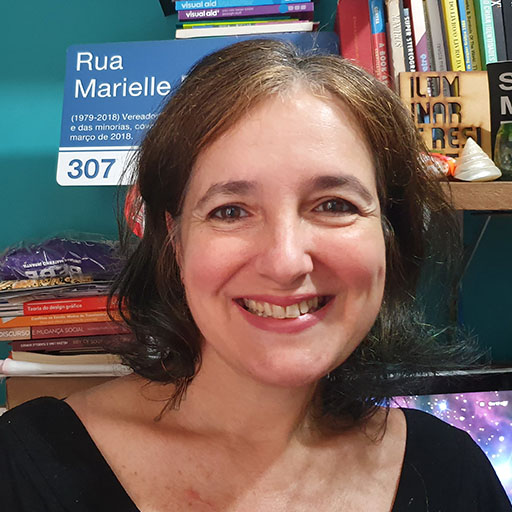
Luciana Perpétuo de Oliveira is a PhD candidate from PPGDesign at PUC-Rio, where she is also a collaborating professor in Graphic Language and associated to LINC Design (Language, Interaction and Construction of Meanings/Design Laboratory). She works mainly in the third sector: at CECIP-Centre for Popular Image Creation, where she works as a project advisor for urban interventions in art and technology in Oi Futuro’s programs aimed at managers and educators in the public school system. She also represents CECIP in the communication campaign for a Global Curriculum of Social Solidarity Economy, mobilizing the Education Network with Adolescents, and integrating the NAMT Center for Studies and Experiments in Memory, Art and Technology. She also works for Aprendiz Cidade Escola, the ACESSE Contemporary Art and Education in Synergy Program at SESI, training teachers to develop pedagogical practices in schools, deepening the STEAM approach and its interface with the SESI Education Network curriculum. At the Fayga Ostrower Institute, she is a member of the board’s advisory board.
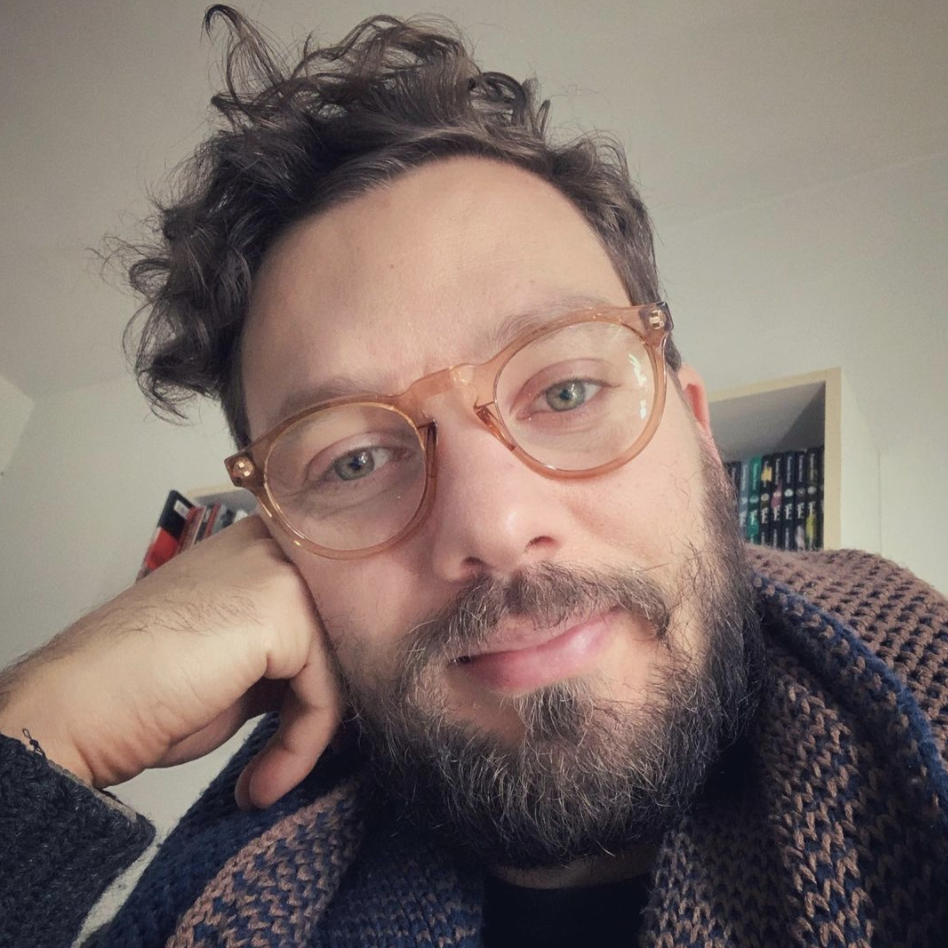
Marco Mazzarotto is a designer, filmmaker, musician, NGO TETO volunteer, and professor at UTFPR. He has a degree in Industrial Design from PUCPR and a Master and Doctor of Design from UFPR. He researches and works in the areas of participatory design, social innovation, critical design, and design pedagogy. As a designer, he has worked in communication projects both for large companies such as HSBC, GVT, Renault, Unicuritiba, as well as for various artists, cultural projects, and NGOs in the Curitiba area. For the Federal Government, he was responsible for the Brazilian International Humanitarian Assistance visual systems for new civil registration documents (Birth, Marriage and Death Certificates). As a volunteer for NGO TETO, he works in diagnosis, community development, and construction of emergency housing in precarious communities in Paraná. As a filmmaker, he wrote and directed the short film Fala, scheduled for release in 2021. He believes that Design cannot and should not be just a tool for the perpetuation of a society full of oppression and guided by unbridled and unsustainable consumption, but rather a factor generating improvements and transformations in all aspects of our lives. He firmly believes that can only happen through critical, horizontal, and participatory design approaches.
Organizations involved
Design & Oppression is a network founded in 2020 to promote solidarity between all the struggles against oppression that, in one way or the other, puts design into question. This network extends the Latin American critical thinking that is already known in Education, Arts, and Sociology to Design. In addition to actions aimed at training critical designers, the network also promotes concrete and continuous social actions. The network has 376 subscribed members, 20% of them are professors, 46% students, and 33% design professionals, spread across several regions of Brazil and other Latin America nations. The network promotes weekly online meetings in Portuguese through a Discord server. This online course is the first attempt to internationalize the network and extends its reach beyond Latin America.
Federal University of Technology – Parana (UTFPR) is a higher education institution with over 110 years. From its start in 1909 as a Technical School targeted at low-income students, UTFPR has grown to become the first Brazilian University of Technology in 2005. Throughout its history, the University kept focused on Technology, with the aim to create solutions for problems that affect the Brazilian reality. UTFPR is spread through thirteen cities in the state of Paraná. It sums up to 33000 students and 3800 staff, distributed among 109 undergraduate programs, 58 master programs and 12 PhD programs, as well as specialization, and extension programs. Regarding International matters, the University has over 145 cooperation agreements with over 30 countries. It offers 86 double-degree programs and other possibilities to the academic community, such as joint research projects and exchange programs. For more information, check its international office.
The National Association of Directors of Federal Higher Education Institutions (Andifes) is responsible for negotiating agreements between federal public universities in Brazil. This institution plays a key role in defending free public education against the several political onslaughts that attempted to privatize public universities in Brazil. The institution sees internationalization as a strategic step to strengthen research and education partnerships.
